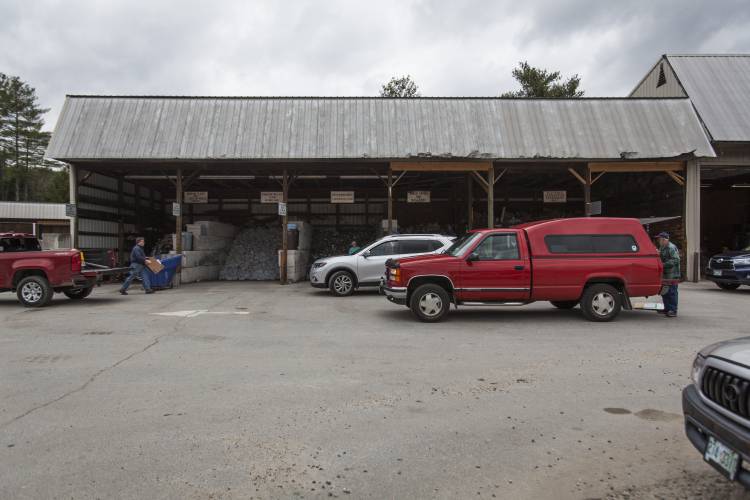Hopkinton tries to nab out-of-town trash bandits

Residents separate recyclables at the Hopkinton/Webster Transfer Station in Hopkinton on Friday, April 1, 2016. (ELIZABETH FRANTZ / Monitor staff) Elizabeth Frantz
|
Published: 05-07-2024 4:49 PM
Modified: 05-08-2024 3:16 PM |
Already struggling to enforce its green bag program in its shared transfer station, Hopkinton realized it faces a new issue: Concord residents trying to dump their trash in town.
Last Saturday, select board members Thomas Lipoma and Jeffrey Donohue took to the transfer station to conduct spot checks and found that residents from other communities, like Concord, were using their transfer station.
“It was just about 50-50 between people who had stickers and people who didn’t,” Donohue said at Monday’s work session.“There was a small number of people who were not from either Hopkinton or Webster and they were trying to use the transfer station.”
With poor compliance, lax enforcement and a high tonnage of waste plaguing Hopkinton’s transfer station for many years, the select board has finally initiated discussions on addressing the longstanding issue.
The select board’s first step is to issue new permit stickers to ensure the shared transfer station is used only by Hopkinton and Webster residents.
One of the key loopholes contributing to this misuse is Hopkinton’s poor enforcement of its pay-by-bag program, making it a convenient dumping ground for outsiders.
Having various colored trash bags dumped at the transfer station, instead of only the designated green ones, worsens the problem, especially considering that Webster doesn't have a pay-by-bag program.
After much discussion, the select board settled on introducing distinctively shaped or otherwise identifiable stickers for residents of Webster and Hopkinton. The stickers will be color-coded to match vehicle inspection stickers, with annual renewals tied to car registrations.
Article continues after...
Yesterday's Most Read Articles
 Concord planning board approves new casino zoning
Concord planning board approves new casino zoning
 A May tradition, the Kiwanis Fair comes to Concord this weekend
A May tradition, the Kiwanis Fair comes to Concord this weekend
 Lawyers and lawmakers assert the Department of Education is on the verge of violating the law
Lawyers and lawmakers assert the Department of Education is on the verge of violating the law
 Concord softball’s senior class reflects on a dominant four-year run
Concord softball’s senior class reflects on a dominant four-year run
 Concord solidifies plan to respond to homelessness
Concord solidifies plan to respond to homelessness
 Cottage community rebuilds beloved dock after it was destroyed in boat crash
Cottage community rebuilds beloved dock after it was destroyed in boat crash
Another issue the town is dealing with is the stagnant pricing of green bags since the program started in 2010.
The pricing of $1.25 for each large 33-gallon bag and 75 cents for each small 13-gallon bag does not cover the transfer station’s operational costs, which is one of the primary goals of the pay-by-bag program, aside from being an incentive to minimize waste.
Other municipalities, such as Concord, impose significantly higher rates for waste disposal, with residents paying $3.20 per 30-gallon bag and $1.60 per 15-gallon bag.
“The green bags are underpriced, they’ve been underpriced for at least eight or nine years since the program was first initiated,” said Donohue. “It’s 14 years later and the price hasn’t changed. It’s not realistic.”
To cover all transfer station operation costs, Lipoma said that costs for smaller bags would need to rise to $1.67 and for larger bags to $2.56, representing nearly a 100% increase.
However, this proposed hike, coupled with insufficient staff to enforce the green bag program, raised concerns for select board member Steven Whitley.
“I guess I’m worried about increasing the price of the bags without a corresponding increase in enforcement because I think we’re just going to drive people to not use green bags,” said Whitley.
Last year, Hopkinton generated $45,000 from green bag sales with a compliance rate of less than 15%.
But if the select board settles on the new price for the trash bags, the potential for revenue growth is staggering.
Lipoma noted that if full compliance is achieved alongside the new prices, revenue could soar to $375,000. Neal Cass, the town administrator, who has observed the program evolve over the years, recalled that its initial revenue generation ranged from $120,000 to $130,000.
To boost compliance, Lipoma floated the idea of contracting with a private hauler for curbside pickup, but select board members swiftly shot it down, citing concerns over cost.
These proposed measures are still in the discussion phase The select board plans to host a public hearing to share their recommendations and gather input from the community in the coming weeks.
While the primary focus of these changes is to strengthen enforcement of the pay-by-bag program, the select board remains undecided on whether to retain or rescind the program altogether.
If they opt to do away with the program, it would need to be presented to residents at next year’s town meeting
“I don’t like this system we have right now. Honestly, it has a lot of deficiencies that we’re trying to wrestle with,” said Whitley. “I guess I haven’t really decided in my own mind whether we’re at a point where we give up on the green bag system entirely or if we try to staff up, and work through some of the enforcement and other issues.”







 Hometown Hero: Hopkinton PE teacher Jordan Whitaker ran the Boston Marathon as support runner for para-athlete
Hometown Hero: Hopkinton PE teacher Jordan Whitaker ran the Boston Marathon as support runner for para-athlete New book by Mike Pride captures NH literary era
New book by Mike Pride captures NH literary era
